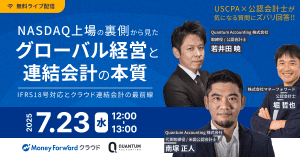Today, we have the pleasure of speaking with Mr. Steven Shinmachi of Gateway Group about the means by which companies can raise capital to achieve growth. Gateway Group is an industry-leading financial communications and digital media advisory firm that provides support to companies at various stages of development, from private startups to companies listed on NASDAQ and the NYSE.
If this article raises any questions or inquiries, please feel free to contact Japan@gateway-grp.com.
The Listing Trends of Japanese Companies and Growing Interest in U.S. Capital Markets
—Until now, Japanese growth companies have primarily chosen the Tokyo Stock Exchange for their listings. Recently, however, interest in the U.S. capital markets has been increasing. What are the reasons behind this shift?
For many years, the Tokyo Stock Exchange was the primary listing destination for Japanese companies. However, this listing process is extremely rigorous and often takes several years to complete. Furthermore, the Tokyo market sometimes suffers from low liquidity and may not provide a sufficient valuation for a company. Faced with these challenges, an increasing number of companies are seeking faster and more efficient means of raising capital.
While private equity remains an option, the U.S. capital markets have recently garnered significant attention. The NASDAQ and NYSE, in particular, offer a rapid listing process and the potential for high valuations and liquidity. Companies tend to be valued highly through follow-on offerings (subsequent public offerings post-listing) and a swift listing process. This is why more Japanese companies are turning their attention to the U.S. capital markets.
—However, we understand there are differences between U.S. exchanges and Japanese exchanges. Could you elaborate on this point?
Certainly. There are indeed customary differences compared to Japanese exchanges, particularly with NASDAQ and the NYSE. If these differences are not fully understood, it can affect post-listing performance. A particularly crucial difference is the strategy for IR, or Investor Relations. In the U.S. capital markets, IR is considered extremely important and is an indispensable element for a company to succeed as a public entity.
IR plays the role of disclosing transparent financial information between the company and its investors, and effectively communicating the company’s growth story and vision. Furthermore, as a strategic function combining finance and corporate communications, IR also serves to effectively promote information sharing between the company, its shareholders, the investment community, and other key stakeholders.
The Importance of IR in U.S. Capital Markets and Its Specific Activities
—Why is IR considered so important?
In the U.S. capital markets, transparent communication regarding a company’s financial condition and strategy is essential for building a relationship of trust with investors. Investors require detailed information to evaluate a company’s growth potential. IR provides that information and acts as a bridge to help investors accurately understand the company’s value and make a fair assessment. Especially in post-listing performance, IR plays a vital role in maintaining the company’s valuation and supporting further growth. To succeed in the capital markets, building and maintaining long-term relationships with the investment community is essential. Therefore, listed companies are required to have an effective IR program that incorporates IR activities.
—Specifically, what kind of IR activities are conducted?
There are various IR activities, but among them, activities where the company discloses its financial status and business strategy more clearly serve to further strengthen the relationship of trust with investors. Moreover, when a company needs to raise new capital in the course of its growth, such IR activities become an effective way to appeal to existing and new investors.
Key Points for Japanese Companies to Succeed in U.S. Capital Markets
—What should Japanese companies be particularly mindful of to succeed in the U.S. capital markets, and what do investors prioritize when evaluating companies preparing to list?
There are several important points.
First, it is extremely important that the company is profitable and has secured stable cash flow. In the current U.S. capital market, partly due to the persistence of high interest rates, investors are hesitant to invest in growth-oriented companies and are increasingly inclined to invest in financially stable companies. Therefore, ensuring profitability and healthy cash flow in the company’s core business activities is crucial for alleviating investor concerns about the company’s stability, growth potential, and returns.
Second, the presence of IR staff who can speak fluent English is important. To succeed in the U.S. capital markets, it is essential to overcome language barriers and communicate smoothly with investors. This is especially true for roadshows, investor meetings, and investor conferences, where prompt and accurate communication and responses to questions are required.
Third, selecting the appropriate underwriter is also a key factor. The underwriter not only supports the company’s listing process but also has a significant impact on post-listing stock performance. Gateway Group utilizes its extensive network, specializing in micro-cap and small-cap companies, to introduce the most suitable underwriter for a company’s needs.
Fourth, stable financial performance, demonstrated through consistent execution and a proven track record, is a critical element that substantiates the company’s growth story. Gateway Group works with management to craft a story backed by a strong financial foundation, emphasizing how the company is differentiated from its competitors and proposing its value within the industry.
Fifth, the timing of the listing is important. Companies will be asked by investors, “Why are you listing now?” In response, the company must strategically explain that entering the U.S. stock market is the optimal expansion strategy, presenting its past financial stability, scalability, growth potential, and plans for business expansion into the U.S. market. Gateway Group works with the company’s management team to prepare convincing answers to these questions and to present growth opportunities based on financial performance, thereby supporting the emphasis that “now” is the optimal time to enter the U.S. capital market.
Finally, the sixth point is establishing a digital presence. Opening a U.S.-facing corporate website and utilizing social media are important strategies for sharing corporate information and disseminating the equity story even before the listing process begins, especially for Japanese companies without existing operations in the U.S. In addition to investor relations, Gateway Group offers public relations, web development, and social media capabilities to help Japanese companies increase their digital presence and corporate brand awareness in the U.S. capital market before listing.
—That is very interesting. Is there anything else Japanese companies should know to succeed in the U.S. capital markets?
Yes, one thing frequently observed with Japanese companies is a lack of understanding of the difference between IR and PR. Both are important for increasing a company’s visibility in the U.S. capital markets, but in Japan, these two roles are often confused. IR and PR have distinct roles.
IR aims to clearly communicate financial information and strategic initiatives to existing and prospective investors and analysts who are interested in the company’s finances and performance. From a regulatory standpoint, it is required to comply with SEC regulations and Regulation Fair Disclosure (Regulation FD). The success of IR is measured by the company’s perception in the capital markets, investor engagement, analyst coverage, and the accuracy of financial information.
On the other hand, PR aims to enhance the company’s image, brand value, and awareness among a broader audience, including the media, customers, employees, and other key stakeholders. Regulations are relatively lenient, following general laws and rules for information dissemination. Success metrics include the extent of media coverage, corporate awareness, social media activity, and overall reputation.
IR is an essential element for a company to be properly valued in the capital markets and to gain support from investors, while PR is an activity to improve the company’s overall image. Understanding the difference between the two and appropriately utilizing each role is conducive to a company’s success.
Post-Listing IR Strategy is Key to Supporting Corporate Valuation and Growth
—You mentioned that post-listing IR is a crucial key to maintaining a company’s valuation and supporting further growth. Could you tell us more about post-listing IR activities?
Companies come to realize the importance of IR even more acutely after they have listed. Post-listing IR is indispensable for a company to continue being appropriately valued in the market. Successful IR activities go beyond basic activities like drafting press releases, disseminating information broadly, and supporting earnings announcements. IR is deeply involved in the company’s business by providing daily strategic advice to support its success in the U.S. capital markets.
IR activities are also an important means of maintaining and strengthening relationships with investors and analysts. This is because effective communication through IR activities is essential to support the company’s growth and earn trust from investors. In addition to maintaining relationships with existing shareholders and analysts, it is also important to build new relationships with potential investors and analysts through investor conferences. This helps to showcase the company’s business opportunities, improve corporate visibility, and increase institutional investor ownership.
Therefore, without a comprehensive IR program, a company will struggle to obtain an accurate valuation and will find it difficult to gain recognition in the U.S. investment community and stock market.
With over 25 years of experience, Gateway Group provides strategic consulting services to help companies effectively communicate their growth story and vision to investors and earn their trust, thereby supporting their success in the U.S. capital markets.
Conclusion
—Finally, could you tell us a little more about Gateway Group’s services?
As a leading financial communications and digital media advisory firm, Gateway Group provides support tailored to a company’s stage of development, from private emerging companies to public companies listed on NASDAQ and the NYSE. Recently, we have expanded our operations into the Japanese market, as opportunities have increased to guide and support Japanese companies aiming to list in the U.S. capital markets, serving as a strategic partner throughout the listing process. In this process, we have identified several key challenges that must be overcome to succeed in the capital markets.
Our goal is to help companies effectively manage the flow of information with investors and other stakeholders and to deliver a consistent corporate message. Particularly for companies considering a listing in the U.S. capital markets, we provide insights to assess timing and market conditions, and offer strategic support throughout the entire listing process. Furthermore, we also provide ongoing IR program support to help post-listing companies succeed in the market.
If this article raises any questions or inquiries, please feel free to contact Japan@gateway-grp.com.
Our firm provides support for U.S. listings, including Nasdaq, for Japanese companies. If this article has piqued your interest and you wish to learn more, please do not hesitate to contact us. We look forward to the opportunity to speak with you—those who are driving forward today with an eye toward the future—and to offer our support where we can be of assistance. For inquiries, please feel free to reach out to us using the contact form below.










